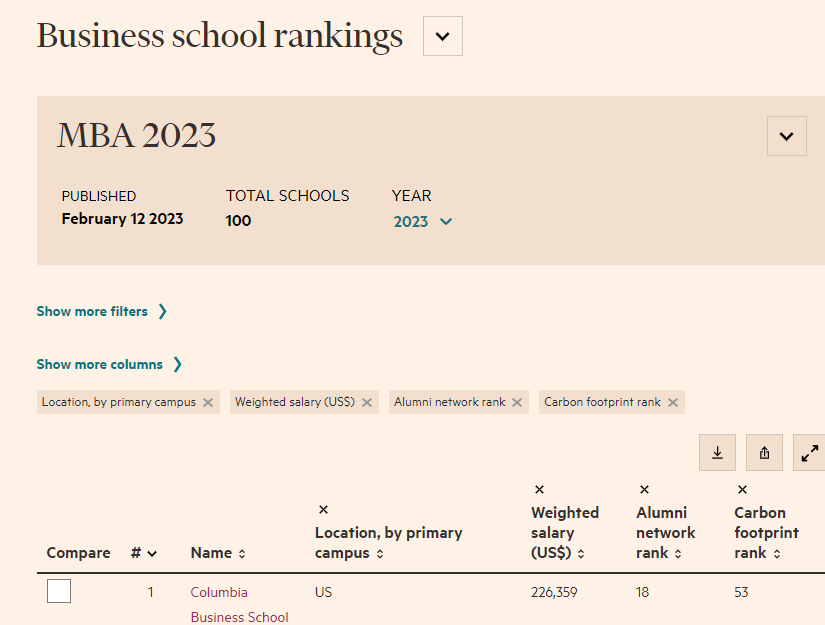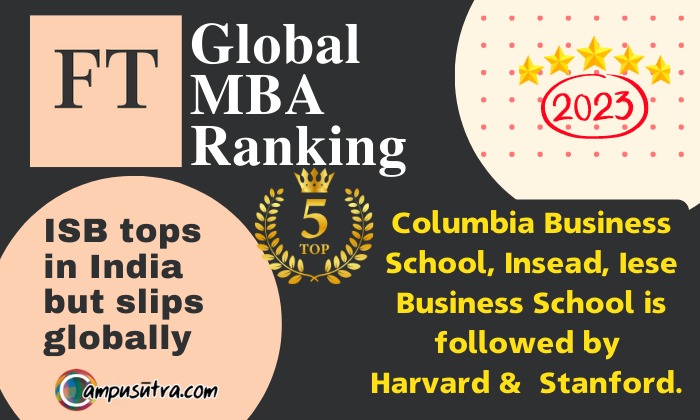Financial Times MBA Ranking 2023: US business schools, led for the first time by Columbia in New York, dominate the top of the FT Global MBA Ranking in its 25th year. Columbia Business School Tops in Overall Ranking 2023. The Indian School of Business (ISB) has been ranked first in India in the Financial Times (FT) Global MBA Ranking 2023 which was released on Monday. The institute is the only Indian B school that made it to the Top 50 this year, with 39th rank globally and 6th rank in Asia. ISB has performed well on the parameters like women in the class, career progress, salary percentage increase, and alumni network.
FT Executive MBA Rankings 2022. ISB Jump 24 Places
Of the leading tier of 18 of the 100 business schools ranked in 2023, 13 are in the US, including Harvard, Stanford and Berkeley. Two top-tier schools are in France: Insead, placed second, and HEC Paris. One school — third-placed Iese — is in Spain; one, SDA Bocconi, is in Italy; and another, London Business School, is in the UK.
Stanford, Harvard & Wharton top QS World Ranking for B Schools
The US dominates in part because the assessment focuses on outcomes, giving significant weight to salary levels and rises three years after completion of the MBA. Twelve of the 14 highest paying MBAs are from US business schools, led by Stanford, with an average weighted alumni salary of $248,669.
QS World University Ranking
ISB retains top slot in India; slips in Global ranks by 7 in FT Global MBA Ranking 2023
MBA ranking update reflects 25 years of change
When the FT first launched its MBA ranking a quarter of a century ago, most of the content was read in print, General Electric was among the world’s largest companies and neither Greta Thunberg nor the term ESG (environmental, social and governance) had been born.
| Rankings | Name | Location |
| 1 | Columbia Business School | US |
| 2 | Insead | France/Singapore |
| 3 | Iese Business School | Spain |
| 4 | Harvard Business School | US |
| 5 | Stanford Grauate School of Business | US |
| 6 | SDA Bocconi School of Management | Italy |
| 7 | University of California at Berkeley: Hass | US |
| 8 | Cornell University: Johnson | US |
| 9 | Northwestern University, Kellogg School of Management | US |
| 10 | Yale School of Management | US |
| 11 | Duke University’s Fuqua School of Business | US |
| 12 | MIT: Solan | US |
| 13 | University of Chicago: Booth | US |
| 14 | UCLA Anderson School of Management | US |
| 15 | Dartmouth College: Tuck | US |
| 16 | London Business School | UK |
| 17 | HEC Paris | France |
| 18 | University of Virginia: Darden | US |
| 19 | New York University: Stern | US |
| 20 | Ceibs | China |
| 21 | University of Southern California: Marshall | US |
| 22 | IE Business School | Spain |
| 23 | University of Cambridge: Judge | UK |
| 24 | SUFE: College of Business | China |
| 25 | NUS | Singapore |
The world has changed radically since that 1999 ranking. Digital technology has come to dominate business and society (including the rise of ft.com); globalisation and the associated political settlement is under threat in a more fragmented, multipolar world; and the future of the planet has moved more to the centre of public consciousness.
Meanwhile, the number of business schools and MBAs — as well as a range of other management undergraduate, graduate and non-diploma offerings — has grown sharply. The “great resignation” of the Covid pandemic and the prospect of renewed economic slowdown could provide new opportunities for universities.
Demand for education is typically countercyclical, and there is fresh interest from people of all ages in returning to study, such as Twitter employees who questioned Elon Musk’s macho call for an “extremely hardcore” working environment over an enlightened approach to work-life balance and working patterns. All the more reason for our more nuanced ranking to continue, to help drive accountability.
Global MBA Ranking 2023: View the MBA ranking and report. Register for the February 22 Spotlight on MBA online event, and the MBA 101 guide to getting into business school.
For many with an MBA, there remains a high “return on investment”. Vivek Murthy, the US surgeon general, describes its importance to his career in supplementing his medical training, especially through meeting people from different backgrounds, developing introspection, leadership skills, and the ability to reimagine the world.
Yet the direct, opportunity, and emotional costs of an MBA are high, and, as we report, there are signs of an increasing number of students seeking financial aid. There is an explosion of alternative ways to develop management skills and networks, and the digital revolution, including the advent of artificial intelligence, means the sector will face still greater disruption ahead.
We also sought the views of three academics who published an influential study last year showing no evidence that chief executives with MBAs increase sales, productivity, investment or exports. The biggest shift when a boss with a business degree took over, they said, was a fall in wages and the share of revenues going to the workforce. The CEO and shareholders gained, at least in the short term; other stakeholders lost out.
“The whole business school experience may need to be rethought,” the academics argue: a reform not only to teaching but also to the wider student experience, including how they develop and cultivate their future networks.
Students themselves have been among the greatest catalysts for reform, while recruiters and faculty often lag behind. Della Bradshaw, the founding editor of the FT MBA ranking, reflects on the background and evolutions of business schools over the past 25 years — including their reactions to the ranking itself.
 From the start, despite opposition, she recognised the importance of tracking the share of female students, faculty and boards at schools in order to hold them accountable, provide signals for those deciding where to study and drive a greater gender balance. Happily, there has been progress, though it stops short of equality.
From the start, despite opposition, she recognised the importance of tracking the share of female students, faculty and boards at schools in order to hold them accountable, provide signals for those deciding where to study and drive a greater gender balance. Happily, there has been progress, though it stops short of equality.
This edition of the ranking brings some significant changes in our methodology, so as to track and encourage an embrace of people, purpose and planet, alongside profit, in business. These values are difficult to instil and measure, but we have made modifications designed to track increased diversity in incoming cohorts of students, and in teaching and operations of schools around sustainability.
We now credit schools — or their wider universities — that set net zero targets and make public their carbon audits and teaching tools for cutting emissions. There has been a sharp increase in such activities, which provide agency and inspiration to future managers and entrepreneurs. European schools, in particular, have made advances.
These methodology changes reflect our wider efforts to report on business schools’ activities to engage with societal challenges, including through our Responsible Business Education Awards and report.
We also present other innovations in this report, including a sample teaching case — the classroom staple of many business schools. At a time when there is appetite for topical examples for debate, with a broader range of protagonists, issues and geographies, we describe a management dilemma for an African entrepreneur who was mulling expansion in the public healthcare sector.
For those who are considering a business degree, we recently launched periodic webinars to supplement our ranking and broader coverage of business education. We have also created MBA 101, a free email course to guide potential applicants through the process. As always, we remain open to feedback and suggestions. Andrew Jack is the FT’s global education editor





